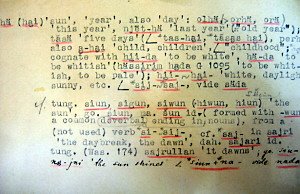Korean language and G.J. Ramstedt (on KBS, Oct 9)
Looking at the synopsis of the 3-part KBS program on Korean language and languages in general for which a filming crew visited Helsinki last summer, it seems to be using a very broad brush in painting the picture. Anyway, for a good summary of the position of the recent linguistics scholarship on the relation of Korean to other languages, I'd recommend those in Korea take a look at what professor Juha Janhunen of the dept of East Asian Studies at the U of Helsinki is telling in an interview in the program. The makers of the program were eager to get a confirmation that Korean belongs to the Altaic group, but professor Janhunen told that the basis for the existence of any Altaic group is very weak in the first place.알타이 언어학의 창시자 ‘람스테트’는 누구인가?  Part 1, where the above comes out, will be aired on KBS1 this Saturday (Oct 9) at 8-9 pm. Part 1, where the above comes out, will be aired on KBS1 this Saturday (Oct 9) at 8-9 pm. No, I will not be appearing this time - my turn will on the 20th;) In the picture, professor G.J. Ramstedt's etymological notes on the Korean word hae, "sun". Update. I also hope that each and everyone residing in Korea is able to cope with the overabundance of the praise for the superiority of the Korean alphabet. I'd like to be in Korea now just to argue that what Koreans are taught to be the basis of the superiority of han'gûl / han'geul / hangul / 한글 / 韓글 - it's correspondence to the "sounds of the language" and the single pronunciation of the letters - is actually its biggest limitation, making it usable only for Korean. And the Koreans' line of thinking that only hangul can truely represent the Korean language in writing and the subsequent mess of writing Korean in the Latin alphabet is only inhibiting the spread of Korean ideas and things to the world. But it's a good script. (I think on the Hangul day I'll write an entry in Korean, using Latin characters in their Finnish pronunciation. There you'll have some Korean...) • Some hangul praise in Manmulsang column in Chosun Ilbo. If only that manmulsang was written in Chinese characters so I could be sure what it means... Most likely it's not 萬物商, "general store", but 萬物相, "the form of all kinds of things". But hey, the writer suggest that why not make hangul characters to represent F and V as well? 세종대왕 이후 우리가 한글을 더 나은 세계 문자로 개량하기 위해 얼마나 노력했나를 되돌아봐야 한다는 말이다. 한글에 시각적 아름다움을 불어넣는 문제는 오래된 숙제다. 세계화의 시대에, 현재는 마땅한 표기방법이 없는 영어의 ‘F’나 ‘V’ 발음을 한글로 표기하는 방법도 고민해볼 만하다.But F and V in which kind of pronunciation? American English of course! It's after all yôngô alp'abet, as the writer tells. But I'd have a couple of other characters/sounds as well: Ä, Ö, RR, L/R, Y. Russians would have a fistful of different s's to make a hangul character for, and so on... • Kudos for a recent Hankyoreh editorial for using the word romaja to mean the Latin characters. For us non-English speakers, that feels good. Categories at del.icio.us/hunjang: Koreanlanguage ∙ academic ∙ Korea-Finland ∙ Koreanstudies |



Comments to note "Korean language and G.J. Ramstedt (on KBS, Oct 9)" (Comments to posts older than 14 days are moderated)
한글 is by no means a universal alphabet, but it's great for its intended use. And it beats using Chinese characters.
However, I have no stomach this year for the usual round of 한글 adoration, so my 한글날 post will have a lighter touch.
My 한글날 post will be found at www.kangmi.org later today.
강미 (who forgets that she doesn't want to be completely anonymous)
Write a Comment